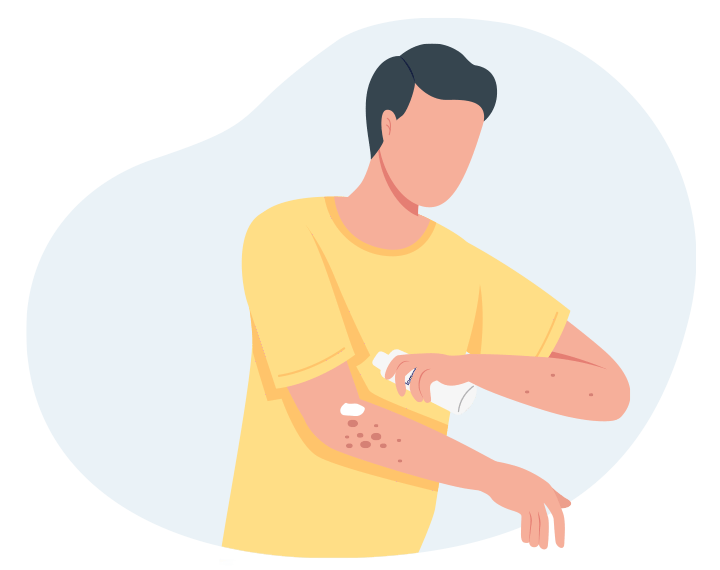
Breaking the itch/scratch cycle

Sleep
Sleep may be enhanced by creating and adhering to:
- a sleep schedule
- creating a restful sleep environment
- limiting nicotine, caffeine, alcohol
- limiting the use of electronic equipment, especially in the evening.

Scratching alternatives
A gentler alternative to scratching, is patting the itchy area.
It is tempting to scratch your skin when it feels irritated, however scratching your skin will cause further damage, leading to further irritation.

Emotional Impact
Utilising strategies to try and reduce the stress and anxiety in your life may begin to help manage eczema flare-ups. While it may not eliminate your eczema, it may help to alleviate some of the common symptoms like itching and scratching.
Some useful techniques to help you relax may be*:
- Practising yoga
- Practising mindfulness
- Walking
- Reading
- Painting
- Baking

Exercise
Regular exercise can be an extremely effective way to combat stress and anxiety. Something as simple as a short walk can trigger the release of hormones that make you feel good.

Diet
Although there is little scientific evidence connecting diet and eczema, it is important to stick to a healthy well-balanced diet and always consult your doctor before making any changes to your child’s diet**.
It is also very important to keep well hydrated. Your skin cells need to be full of water to help make a super strong skin barrier. This helps keep bacteria out and water in. In eczema or other dry skin conditions there is not enough water in these cells to do this, so try to drink plenty of water throughout the day.
The NHS Eatwell Guide says we should drink 6 to 8 cups or glasses of fluid a day.
The Living with Eczema App
+ Track and monitor changes in your condition through the Skin Diary and Photo Journal.
+ Explore helpful tips and lifestyle advice from a Dermatology Nurse Consultant.
+ Set reminders for your appointments, prescriptions and treatments.
+ Learn more about the different available treatment options for eczema.
+ Discover interactive treatment guides.
NEXT SECTION
Treatment Options
Find out more about the different treatment options available.
NEXT SECTION
Parents & Carers
Find out more about how to support your child with their eczema.
NEXT SECTION
Woundcare
Find out more about how emollients can support in the care of vulnerable skin.
NEXT SECTION
The Living with Eczema App
Find out more and how to download.
NEXT SECTION
Useful Links
Check out useful links to help you with your condition.
NEXT SECTION
About Eczema
Find out more about skin and eczema.
NEXT SECTION
What is Eczema
Find out more about the different types of eczema
NEXT SECTION
Treatment Options
Find out more about the different treatment options available.
NEXT SECTION
Parents & Carers
Find out more about how to support your child with their eczema.
NEXT SECTION
Woundcare
Find out more about how emollients can support in the care of vulnerable skin.
NEXT SECTION
The Living with Eczema App
Find out more and how to download.
NEXT SECTION
Useful Links
Check out useful links to help you with your condition.
NEXT SECTION
About Eczema
Find out more about skin and eczema.
NEXT SECTION
What is Eczema
Find out more about the different types of eczema
*These are some examples of activities that can reduce stress and bring a sense of contentment. As everyone is different, these may not be for you and you may find that other activities suit you best.
**One person’s eczema trigger may not be the same as another and it may be a combination of the above. Your symptoms may be worse at different times of the year or affect different areas of your body each time a flare-up happens. Keeping a journal of your flare-ups and lifestyle may help you identify causes and triggers.
